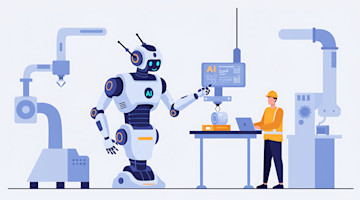“Make every detail perfect and limit the number of details to perfect.”
– Jack Dorsey, Co-founder of Twitter
This is a published version of the AMT Tech Report newsletter. You can sign up to get the Tech Report in your inbox here.
1. Human Innovation at Scale
Amidst all the talk of AI, it’s important to emphasize human empowerment. That’s the philosophy of Nobuyuki "Nobu" Ashida, the president of MISUMI USA. While he’s built his career on creating flexible, future-leaning companies, he also leans into supporting human teams, pointing to them as the true source of innovation. His company’s latest project? AI-enabled manufacturing on demand, where engineers can upload a CAD file to get a production-ready part, driving innovation at scale.
2. GE Is Reshoring Your Refrigerator for $3B
GE Appliances is shifting more production of refrigerators, gas stoves, and water heaters back to the southern United States from Mexico and China. This isn't just slapping on a new coat of paint either; they’re doing a major remodel to the tune of $3 billion. While most of GE’s production is already done stateside, this additional expansion is expected to add more than 1,000 jobs, help modernize GE Appliance’s plants, and ramp up their production.
3. But Will They Play Pokemon Go Up There?
Augmented reality is coming to the Air Force. AR systems built by Red 6 will soon be installed in F-16 cockpits, allowing pilots to see simulated aircraft while flying live missions. Until now, the tech had only been tested in trainers, but this move marks its first step into operational fighters. The system promises a leap in scalable, immersive training, without the cost or difficulties of live air fueling tankers, wingmen, adversary aircraft, or UFOs.
4. The Sound of Qubits
Caltech scientists have just found a way to better preserve the data held long term by quantum computers: converting electrical signals into sound waves. The technique uses a microscopic mechanical oscillator like a tuning fork. When electricity is pumped in, the oscillator’s plates are able to interact with electrical signals, creating a retrievable memory. This method allows for memory to last 30 times longer than current qubits, aka quantum computer versions of bits, which represent 1s and 0s.
5. The Center for Digital Twins Wants You!
Arizona State University and the University of Michigan are creating a Center for Digital Twins in Manufacturing, and they’re looking for industrial partners. Their mission? Standardize digital twins, including creating reusable, customizable twins. Other goals: Create digital twins for human-robot collabs and simulations and build twin-generating software. Both universities also have physical manufacturing systems to test the twins. No word yet on whether they’re giving the twins rhyming names.
To get the latest tech developments delivered directly to your inbox, subscribe to the weekly Tech Report here.
To hear the latest in additive manufacturing, material removal, automation, and digital manufacturing, subscribe to the AMT Tech Trends podcast here.






